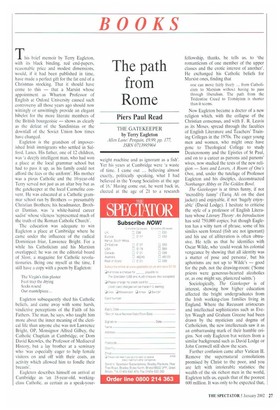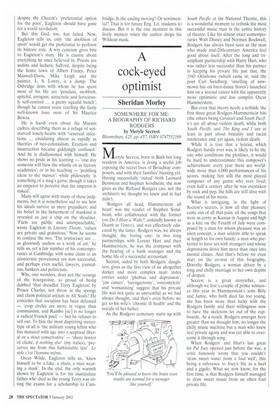The path from Rome
Piers Paul Read
THE GATEKEEPER by Terry Eagleton Allen Lane/ Penguin, £9.99, pp. 177, ISBN 0713995904 This brief memoir by Terry Eagleton, with its black binding, red end-papers, reasonable price and modest dimensions, would, if it had been published in time, have made a perfect gift for the fat end of a Christmas stocking. That it should have come to this — that a Marxist whose appointment as Wharton Professor of English at Oxford University caused such controversy all those years ago should now wittingly or unwittingly provide an elegant bibelot for the more literate members of the British bourgeoisie — shows as clearly as the defeat of the Sandinistas or the downfall of the Soviet Union how times have changed.
Eagleton is the grandson of impoverished Irish immigrants who settled in Salford. Lancs. His father, one of 12 children, was 'a deeply intelligent man, who had won a place at the local grammar school but had to pass it up, as his family could not afford the fees or the uniform'. His mother was a pious Catholic and the 10-year-old Terry served not just as an altar boy but as the gatekeeper at the local Carmelite convent. He was educated at a Catholic grammar school run by Brothers — presumably Christian Brothers; his headmaster, Brother Damian, was 'a white-haired career sadist' whose vileness 'represented much of the truth of the Roman Catholic Church'.
The education was adequate to win Eagleton a place at Cambridge where he came under the influence of the radical Dominican friar, Lawrence Bright. For a while his Catholicism and his Marxism overlapped: he was on the editorial board of Slant, a magazine for Catholic revolutionaries. Being one myself at the time, I still have a copy with a poem by Eagleton:
The Virgin's thin plaster Feet trap the drying Socks round Our mantelpiece...
Eagleton subsequently shed his Catholic beliefs, and came away with some harsh, vindictive perceptions of the Faith of his Fathers. The man, he says, who taught him more about the inner meaning of the clerical life than anyone else was not Lawrence Bright, OP, Monsignor Alfred Gilbey, the Catholic Chaplain at Cambridge, or Dom David Knowles, the Professor of Mediaeval History, hut a lay brother at a seminary who was especially eager to help female visitors on and off with their coats, an activity which allowed him to fondle their breasts'.
Eagleton describes himself on arrival at Cambridge as 'an 18-year-old, workingclass Catholic, as certain as a speak-your
weight machine and as ignorant as a fish'. Yet his years at Cambridge were 'a waste of time. I came out ... believing almost exactly, politically speaking, what I had believed in the Young Socialists at the age of 16.' Having come out, he went back in, elected at the age of 21 to a research
fellowship, thanks, he tells us, to 'the romanticism of one member of the upper classes and the erotic interest of another'. He exchanged his Catholic beliefs for Marxist ones, finding that
one can move fairly freely from Catholicism to Marxism without having to pass through liberalism. The path from the Tridentine Creed to Trotskyism is shorter than it seems.
Now Eagleton became a doctor of a new religion which, with the collapse of the Christian consensus, and with F. R. Leavis as its Moses, spread through the faculties of English Literature and Teachers' Training Colleges in the 1970s. The eager young men and women, who might once have gone to Theological College to study Deuteronomy and the Epistles of St Paul, and on to a career as parsons and parsons' wives, now studied the texts of the new religion — Sons and Lovers, A Room of One's Own, and, under the tutelage of Professor Eagleton and his disciples, deconstructed Northanger Abbey or The Golden Bowl.
The Gatekeeper is at times funny, if not 'incredibly funny' (Tariq Ali on the dust jacket) and enjoyable, if not 'hugely enjoyable' (David Lodge). I hesitate to criticise the style of a professor of English Literature whose Literary Theory: An Introduction has sold 750,000 copies; but though Eagleton has a witty turn of phrase, some of his similes seem forced (fish are not ignorant) and his use of alliteration is often obtrusive. He tells us that he identifies with Oscar Wilde, who .could wreak his colonial vengeance by showing that all identity was a matter of pose and persona', but his aphorisms are not up to Wilde's — good for the pub, not the drawing-room: (Some priests were generous-hearted alcoholics or, as one might say, plastered saints.)
Sociologically, The Gatekeeper is of interest, showing how higher education affected the bright undergraduates from the Irish working-class families living in England. Where the Recusant aristocrats and intellectual sophisticates such as Evelyn Waugh and Graham Greene had been drawn by the mysticism and dogma of Catholicism, the new intellectuals saw it as an embarrassing mark of their humble origins. Not only Eagleton but writers from a similar background such as David Lodge or John Cornwell still show the scars.
Further confusion came after Vatican II. Remove the supernatural consolations promised by Christ to the poor, and you are left with intolerable statistics: the wealth of the six richest men in the world, Eagleton tells us, equals that of the poorest 600 million. It was only to be expected that, despite the Church's 'preferential option for the poor', Eagleton should have gone for a world revolution.
But this God, too, has failed. Now, Eagleton tells us, only 'the abolition of sport' would get the proletariat to perform its historic role. A wry cynicism gives bite to Eagleton's story. He is caustic about everything he once believed in. Priests are sadists and lechers; Salford, despite being the home town of Albert Finney, Peter Maxwell-Davis, Mike Leigh and the painter, L. S. Lowry, is a dump. The Oxbridge dons with whom he has spent most of his life are 'petulant, snobbish, spiteful, arrogant, autocratic and ferociously self-centred ... a pretty squalid bunch'; though he cannot resist retelling the fairly well-known bons mots of Sir Maurice Bowra.
He is harsh even about the Marxist cadres, describing them as a refuge of sexstarved lonely-hearts with 'venereal infections ... circulating almost as rapidly as theories of neo-colonialism. Erection and insurrection became giddyingly confused.' And he is disillusioned with himself. He shows no pride in his learning — 'one day someone will blow the whistle on us literary academics': or in his teaching — 'peddling ideas to the masses': while philosophy 'is something of a mug's game, though it takes an emperor to perceive that the emperor is naked'.
Many will agree with many of these judgments, but it is nonetheless sad to see how his ideals survive as mere prejudices; and his belief in the betterment of mankind is revealed as just a chip on the shoulder. 'Facts are public and unimpeachable,' wrote Eagleton in Literary Theory, 'values are private and gratuitous.' Now he seems to confuse the two. 'The aristocracy are ... as gloriously useless as a work of art,' he tells us, yet a fair number of his contemporaries at Cambridge with some claim to an aristocratic provenance are now successful, and perhaps even useful, lawyers, journalists, bankers and politicians.
Why, one wonders, does not the scourge of the bourgeoisie, so proud of being dubbed 'that dreadful Terry Eagleton' by Prince Charles, not throw in the sponge and claim political asylum in All Souls? He concedes that socialism has been defeated — 'crop circles are more in vogue than communism, and Rambo [sic] is no longer a radical French poet' — but he refuses to sell out. To him the most dispiriting stereotype of all is 'the militant young leftist who has matured with age into a sceptical liberal or a stout conservative' — 'sheer horror of cliche, if nothing else' (my italics), 'preserves me from this fashionable fate'. Le style c'est l'homme meme.
Oscar Wilde, Eagleton tells us, 'knew himself to be a fake, a sham, a man wearing a mask'. In the end, the only warmth shown by Eagleton is for his inarticulate father who died as the young Terry was sitting the exams for a scholarship to Cam
bridge. Is the ending moving? Or sentimental? That is for future Eng. Lit. students to discuss. But it is the one moment in this lively memoir when the author drops his Wildean mask.























































 Previous page
Previous page